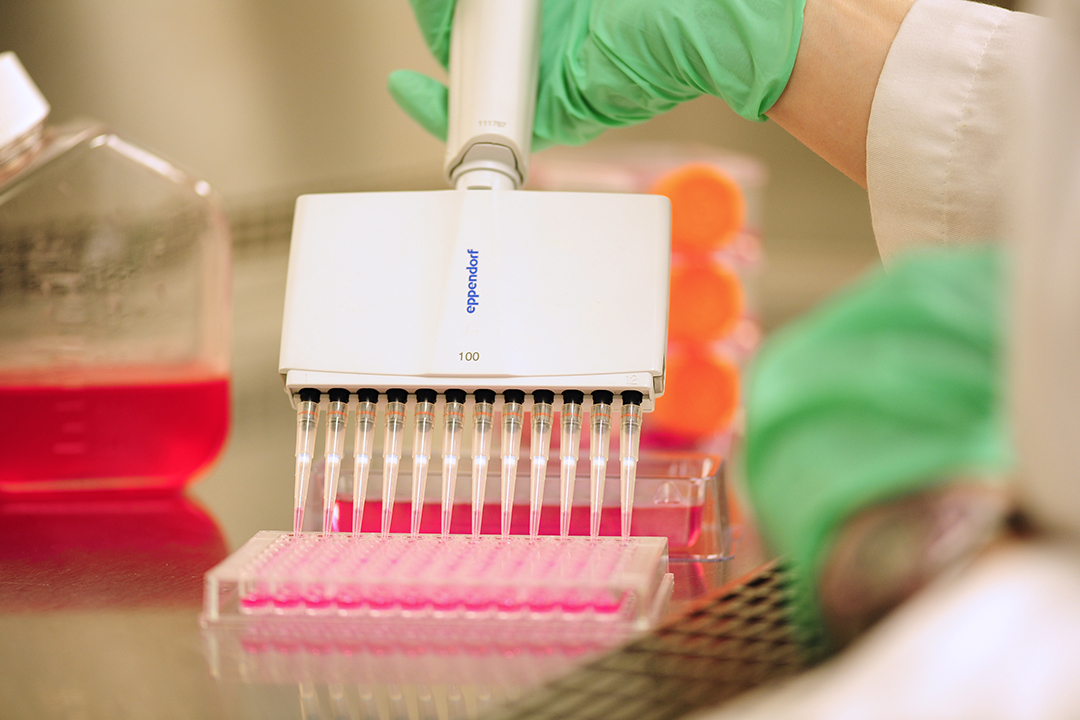
Federal dollars for WCVM-based research and training
Two of Canada’s top research granting agencies have provided funding to support the research efforts of faculty members and graduate students at the Western College of Veterinary Medicine (WCVM).
By WCVM TodayThe new funding will allow research teams at the veterinary college and collaborative centres to address human health issues such as COVID-19, as well as important research questions in food animal and companion animal health.
Dr. Darryl Falzarano, an adjunct professor in the WCVM’s Department of Veterinary Microbiology, is part of a research collaboration that received funding from the Canadian Institutes of Health Research (CIHR) on June 25. The University of Saskatchewan-based team is developing new diagnostic test for detecting SARS-CoV-2 peptides (proteins).
Their research efforts are part of a larger initiative led by researchers at the University of Regina. Dr. Walter Siqueira of the university’s College of Dentistry is leading this study along with another project that is examining the incidence rate of COVID-19 among Canadian dentists. The two USask projects received more than $550,000 in funding from CIHR.
Falzarano is leading critical research targeting vaccine development for SARS-CoV-2 at the USask Vaccine and Infectious Disease Organization-International Vaccine Centre (VIDO-InterVac). In addition to previous federal funding for the vaccine development, Falzarano’s team recently received an additional $50,000 in CIHR funding to support another COVID-19-related study that will focus on what common lab and agricultural animals may be infected with SARS-CoV-2.
Four WCVM faculty members will receive a total of $647,500 in financial support through the Natural Sciences and Engineering Research Council of Canada (NSERC) Discovery Grants Program, which supports ongoing programs of research with long-term goals.
Three of the researchers will also gain an additional $12,500 through the federal agency’s Early Career Researchers Supplemental Funds program.
- Heather Wilson, adjunct professor, Department of Veterinary Microbiology. Research focus: “Impact of hormonal status on the induction of an immune response in the pig upper reproductive tract.” Funding: $42,000 (five years).
- Dinesh Dadarwal, assistant professor, Department of Large Animal Clinical Sciences. Research focus: “Bovine model to study the mechanisms that affect uterine mucosal immunity: role of metabolic status and uterine microbiome.” Funding: $28,000 (five years) plus supplement of $12,500.
- Dylan Olver, assistant professor, Department of Veterinary Biomedical Sciences. Research focus: “Integrative roles of the sympathetic nervous system and the endothelium in cerebrovascular physiology.” Funding: $28,000 (five years) plus supplement of $12,500.
- Matheus Costa, assistant professor, Department of Large Animal Clinical Sciences. Research focus: “Gut host-microbiome-pathogen interaction: understanding the pathophysiology of bacterial infections.” Funding: $24,000 (five years) plus supplement of $12,500.
In June, two WCVM graduate students were among 67 USask graduate students who were awarded nearly $2.5 million in scholarships by NSERC, CIHR and the Social Sciences and Humanities Research Council (SSHRC) — three of Canada’s most important federal granting agencies.
Chloe Quilliam is a Master of Science student whose work is supervised by Dr. Lynn Weber in the WCVM Department of Veterinary Biomedical Sciences. Her research focuses on the effects of feeding pulse-based, grain-free diets on the glycemic response, digestibility and cardiovascular health in dogs.
Jessica Sharpe is a Master of Science student under the supervision of Dr. Behzad Toosi in the WCVM Department of Small Animal Clinical Sciences. Her research focuses on evaluating the expression and function of the EphA2 receptor in canine osteosarcoma.
Both WCVM graduate students received Canada Graduate Scholarship Master’s awards through NSERC. The non-renewable scholarships provide a total of $17,500 over 12 months.
